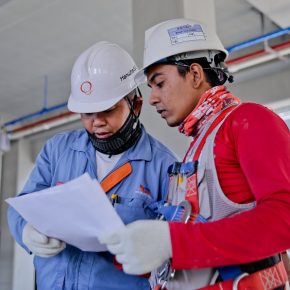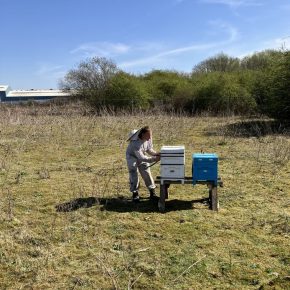
GUEST ARTICLE: How COVID-19 is affecting job security and mental health in the UK construction industry
Danny Marinou, Managing Director of SMAS Worksafe, health & safety accreditation specialists for the construction industry, writes about how COVID-19 is affecting job security and mental health in the UK construction industry in this guest article.
“With a recent report from the Construction Leadership Council stating that employment across the construction industry is likely to fall by 10% by September, it is clear there are difficult times ahead for all in the sector.
Though many building sites have remained open throughout the coronavirus pandemic, the toll this virus will take on individuals, the industry and economy as a whole will be long-lasting.
The report states that 6.7% of apprentices are expected to lose their jobs in the coming months, which could in turn lead to a widening of the skills shortage and could mean the industry will find it hard to recover as quickly as forecast.
But in addition to the economic implications, this will no doubt be damaging to the mental health of those working in an industry which already struggles disproportionately with mental health problems.
The mental health crisis already affecting construction
The Stevenson/Farmer report in 2017 found that men working in construction are 35% more likely to take their own lives than the national average.
Shaun Atkins from Wilmott Dixon mentions in the report that pressures, including, ‘physically hard work, cold and harsh working environments, low pay, long hours, time pressures, job insecurity and a ‘macho culture’,’ are to blame for why construction workers face additional challenges mentally.
The Health and Safety Executive also found that stress, anxiety and depression were up 10% in 2018, suggesting that construction was already struggling to get a handle on the issues faced by workers even before coronavirus became an additional challenge.
Though Covid-19 is first and foremost a physical health issue, its effect on mental wellbeing is still significant.

How the new work environment is affecting mental health
With extended public health guidelines being established to keep workers safe while on construction sites, there have been several adaptations made to the daily operations of building work.
However, it’s difficult to distract from the fact that construction workers have been continuing to work and often interacting with other team members throughout the height of this pandemic.
This may have contributed to feelings of anxiety being felt by many in the industry about contracting the disease themselves or spreading it to others in their household.
Additionally, the widespread nature of the disease will mean that most construction workers will know someone who has suffered from the disease at a time when caring for loved ones and grieving is much more complicated.
On the other hand, the CLC has noted that 32% of direct employees in construction have been furloughed, which offers its own set of mental health challenges that are harder to monitor with limited contact between employers and employees.
With little to fill each day, a lower income and the threat of job insecurity, those on furlough could be struggling to maintain good mental health and may find it harder to reach out for support.
How the future uncertainty of the industry will affect mental health
With the knowledge that 10% of the industry is expected to be without work within a couple of months, the future uncertainty of the sector will only exacerbate the issues being presented by Covid-19.
Recessions are often indicated by a contraction of construction work so news that there was a 40% drop in output in April reported by the ONS will also heighten anxiety around worker’s futures and the security of their jobs in the face of a looming economic crisis.
Given that the construction sector has been aware of its mental health crisis for a number of years there are no doubt companies who have proactively worked towards improving their wellbeing support for staff that will have been an essential lifeline for workers during this time.
However, mass redundancies could mean that many of these staff will lose access to this support which could start to undo the hard work many in the industry have put in to tackle the challenges their workers face.
For this reason, raising awareness of free-to-access tools is essential to helping workers deal with the threats to their mental health no matter what their work situation as the effects of coronavirus influence the future of the industry.
Free resources workers can access even when out of work
The construction industry is working hard to expand their support for its members who struggle with their mental health and there are a number of organisations who provide accessible resources for the construction industry.
The Lighthouse Construction Industry Charity’s mental health helpline saw a 25% increase in calls in April as those in construction sought advice early into the UK’s lockdown.
This charity also offers a free app that’s full of helpful advice and guidance for those who are less confident in discussing their feelings and concerns.
Mates in Mind offers support to businesses looking to improve their wellbeing support offerings but they also signpost to free support resources, as well as a Covid-specific support package that includes financial wellbeing advice.
Though it is important that companies establish stronger and more consistent wellbeing support practices in the long-term, these resources will offer essential help and guidance to those struggling during these next few difficult months.
The UK is starting to emerge from it’s coronavirus-imposed lockdown and the human cost of the pandemic seems to be falling. However, the real challenge of such a disruptive event will come in the recovery.
As the construction industry was already dealing with a crisis of mental health before the pandemic, tackling it will need to be a key focus to ensure the health and safety of as many workers is properly protected.”
Latest news

30th April 2025
Digital Construction Week announces seminar programme for its landmark 10th edition
Digital Construction Week (DCW) returns to ExCeL London on 4 – 5 June 2025 with its most impactful programme yet. It brings together the best and brightest from across AECO, for two days of practical learning and idea sharing.
Posted in Articles, Building Industry Events, Building Industry News, Building Products & Structures, Building Services, Building Systems, Exhibitions and Conferences, Information Technology, news, Restoration & Refurbishment, Retrofit & Renovation, Seminars
29th April 2025
Senior pledges to ‘bee’ part of the solution with new biodiversity initiative
Senior Architectural Systems has installed its first on-site beehive, marking another step forward in its commitment to sustainability and biodiversity.
Posted in Articles, Building Industry News, Building Products & Structures, Building Services, Curtain Walling, Doors, Glass, Glazing, Innovations & New Products, news, Restoration & Refurbishment, Retrofit & Renovation, Sustainability & Energy Efficiency, Walls, Windows
29th April 2025
West Fraser range delivering key benefits for South-East carpentry company
An experienced carpenter and building site manager who has recently set up his own company is using high performance panel products from the West Fraser range.
Posted in Articles, Building Industry News, Building Products & Structures, Building Systems, Case Studies, Garden, Restoration & Refurbishment, Retrofit & Renovation, Sustainability & Energy Efficiency, Timber Buildings and Timber Products
29th April 2025
CPD Courses Available Online From Ecological Building Systems
Ecological Building Systems, a leading supplier of natural building products for sustainable construction, has revealed its comprehensive CPD programme for the year ahead.
Posted in Articles, Building Industry Events, Building Industry News, Building Products & Structures, Building Services, Continuing Professional Development (CPD's), Information Technology, Innovations & New Products, Insulation, Restoration & Refurbishment, Retrofit & Renovation, Seminars, Sustainability & Energy Efficiency, Training, Walls, Waste Management & Recycling
 Sign up:
Sign up: